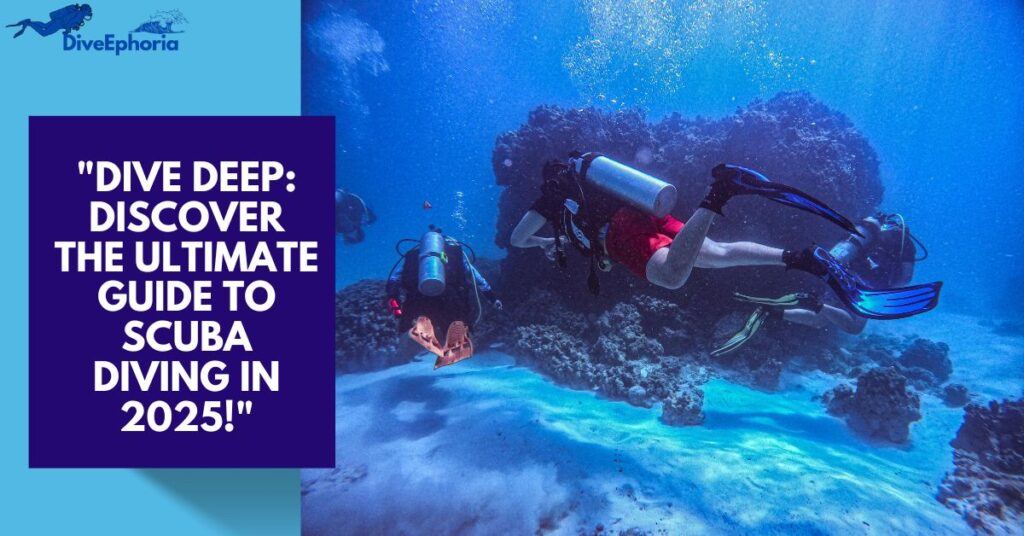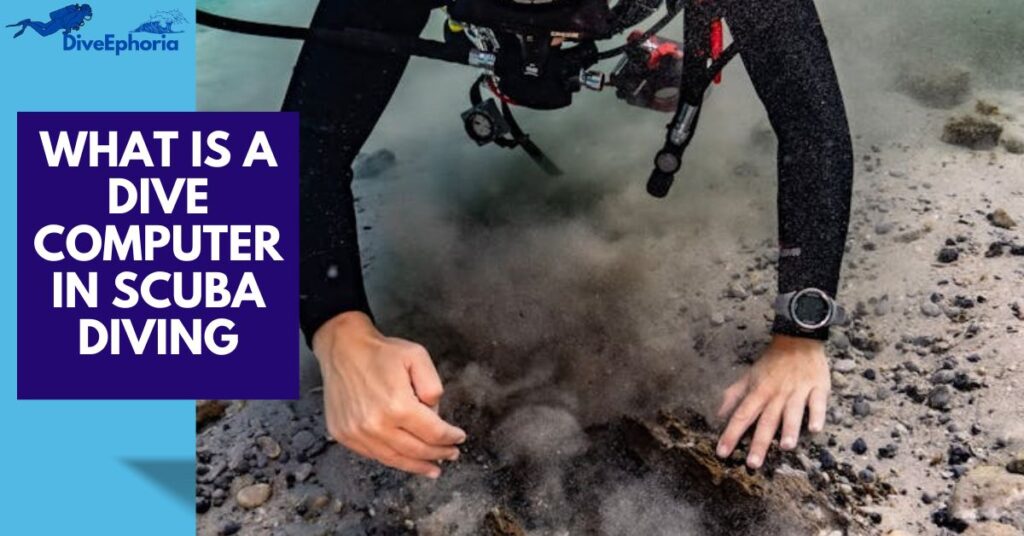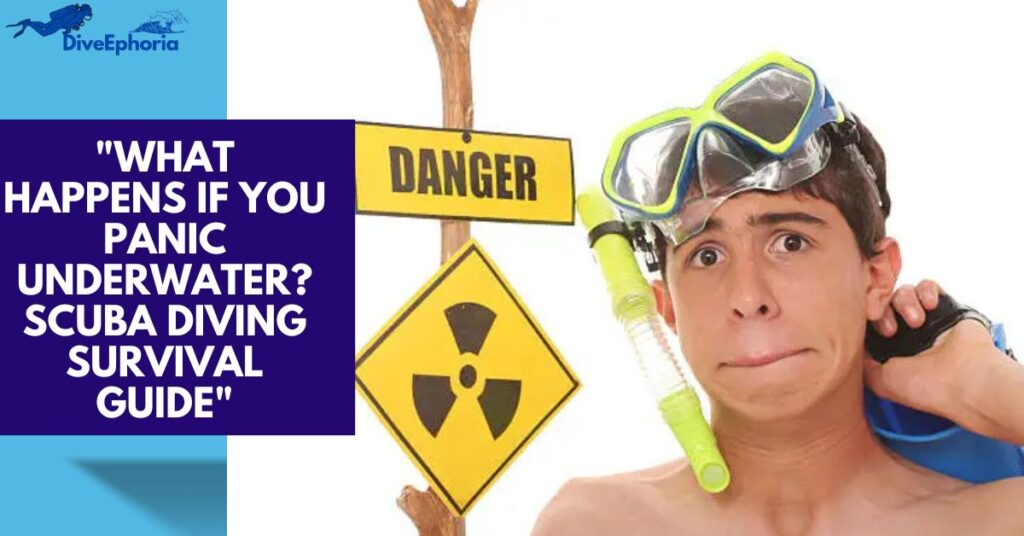
Table of Contents
Introduction
Scuba diving opens up an extraordinary world beneath the waves, offering breathtaking encounters with marine life, vibrant coral reefs, and mysterious shipwrecks. For many, it’s a dream come true—an experience filled with wonder and excitement. However, alongside the beauty of the ocean, there are very real risks every diver must respect, and panic underwater while scuba diving is one of the most serious.
Panic is not just a fleeting feeling of fear; it’s a powerful, often overwhelming response that can quickly escalate into a dangerous situation. Whether you’re a beginner on your first open water dive or a seasoned diver exploring deep wrecks, understanding what happens if you panic underwater while scuba diving is critical to your safety and survival.
When panic strikes below the surface, it can trigger a series of rapid, involuntary reactions—like hyperventilation, disorientation, and loss of buoyancy control—that compromise your ability to think clearly and act appropriately. Left unchecked, underwater panic can lead to serious consequences, including uncontrolled ascents, decompression sickness, or even drowning.
In this comprehensive guide, we’ll dive into what really happens when panic takes hold underwater, explore the common causes of scuba diving panic, and most importantly, share proven strategies to prevent it. By equipping yourself with the right knowledge and preparation, you can transform fear into confidence and enjoy safe, unforgettable adventures beneath the sea.
What Happens If You Panic Underwater While Scuba Diving?
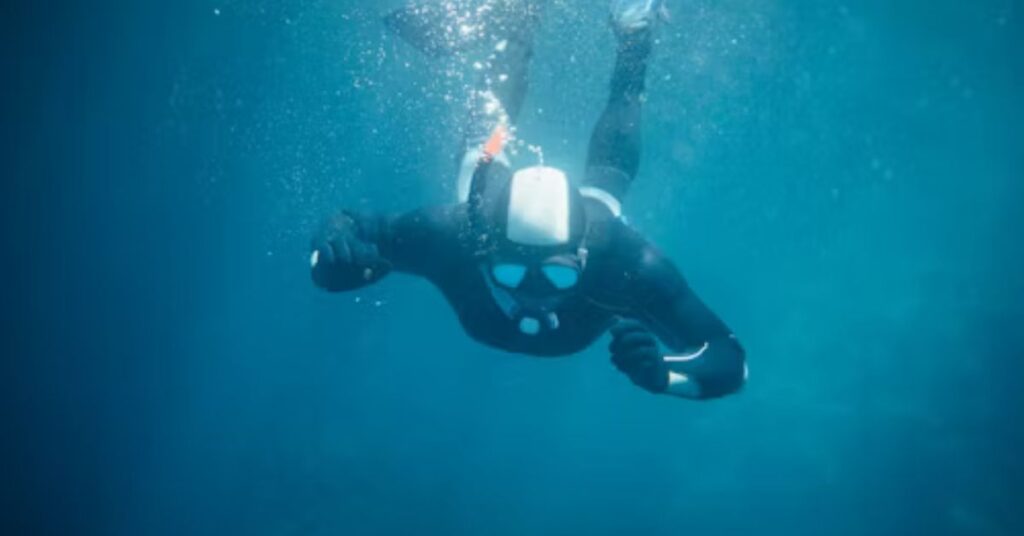
Panic is one of the most dangerous emergencies that can happen underwater, and it’s a leading cause of scuba diving accidents around the world. Understanding what happens if you panic underwater while scuba diving can make all the difference between reacting dangerously and handling the situation safely. Let’s break down exactly what occurs when panic strikes during a dive:
1. Rapid Breathing and Hyperventilation
When panic sets in, the body’s natural “fight-or-flight” response is triggered. One of the first physical reactions is rapid, shallow breathing. Underwater, this can quickly escalate into hyperventilation, where you’re taking in too much oxygen and expelling too little carbon dioxide.
This imbalance can cause:
- Lightheadedness
- Dizziness
- A feeling of suffocation
- Loss of clear thinking
If hyperventilation continues, it can cause a diver to feel like they are not getting enough air, even though their tank is supplying it perfectly. This false sense of suffocation can push a diver into even greater panic, setting off a vicious cycle.
2. Loss of Buoyancy Control
Panic impairs a diver’s ability to manage buoyancy control. In the midst of fear, a diver might unconsciously:
- Inflate their Buoyancy Control Device (BCD) rapidly to ascend
- Deflate their BCD too much and sink dangerously
- Kick or flail uncontrollably without considering proper fin technique
Poor buoyancy control can lead to an uncontrolled ascent or descent, both of which are extremely dangerous. An uncontrolled ascent can cause decompression sickness (“the bends”) or lung overexpansion injuries due to the rapid change in pressure. Meanwhile, sinking too deep can cause nitrogen narcosis, increasing confusion and worsening panic.
3. Disorientation and Poor Decision-Making
As panic overwhelms the diver, mental clarity diminishes. Cognitive functions slow down, making it difficult to:
- Follow safety protocols
- Respond to a situation logically
- Communicate properly with a dive buddy
In extreme cases, a panicked diver may irrationally remove their regulator (thinking it’s not delivering air properly) or even abandon their gear entirely. These are fatal mistakes if not quickly corrected.
4. Emergency Ascent and Its Dangers
If panic drives a diver to rush to the surface without proper ascent procedures, several life-threatening conditions can occur:
- Decompression Sickness (DCS): Rapid ascents prevent dissolved nitrogen from safely exiting the bloodstream, causing painful and potentially deadly bubbles to form in the body.
- Lung Overexpansion Injuries: Holding your breath or ascending too quickly can cause lungs to rupture due to expanding air.
- Arterial Gas Embolism (AGE): Air bubbles can enter the bloodstream, leading to stroke-like symptoms or death.
A safe ascent is slow and controlled, allowing the body to adjust to pressure changes. Panic almost always results in rushing, dramatically increasing risk.
Common Causes of Scuba Diving Panic
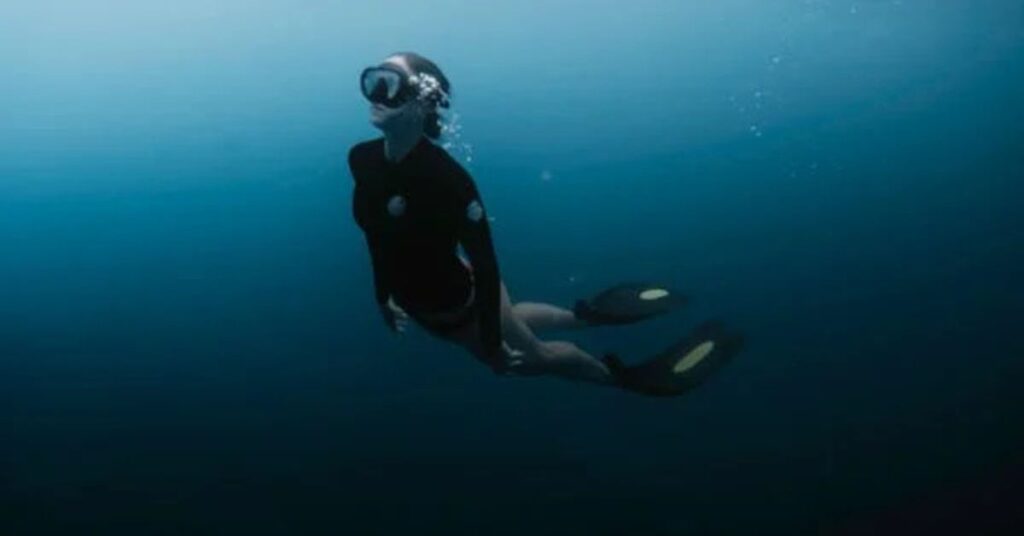
Understanding the common causes of scuba diving panic is essential for both new and experienced divers. Panic rarely happens without warning—it usually stems from specific triggers or a buildup of stressors before and during a dive. By recognizing these causes, divers can take preventive steps to stay calm, confident, and safe underwater.
Here’s a closer look at the most frequent reasons divers panic:
1. Equipment Malfunctions
One of the biggest panic triggers is an issue with scuba diving equipment. Problems such as:
- A leaking mask that fills with water
- A free-flowing regulator that delivers too much air
- A stuck inflator button on the BCD
- Problems with the dive computer signaling an error
Even minor malfunctions can feel catastrophic underwater if a diver isn’t prepared to handle them. Fear of equipment failure alone can also cause anxiety before the dive even begins.
Tip: Regular maintenance, pre-dive checks, and practicing emergency drills can greatly reduce equipment-related panic.
2. Overexertion
Physical exhaustion can sneak up quickly underwater, especially when:
- Fighting against strong currents
- Carrying too much weight
- Swimming too fast or inefficiently
Overexertion leads to labored breathing, muscle fatigue, and feelings of helplessness—all strong panic triggers. In some cases, divers may feel like they can’t catch their breath, leading to hyperventilation and a rapid spiral into panic.
Tip: Dive at a relaxed pace, use slow fin kicks, and avoid carrying unnecessary gear to conserve energy.
3. Low Visibility or Claustrophobia
Diving in conditions with low visibility—such as murky water, night dives, or wreck penetrations—can cause sensory disorientation and feelings of entrapment.
Claustrophobia underwater is a real phenomenon and can be triggered by:
- Tight spaces
- Narrow swim-throughs
- Overhead environments (caves, shipwrecks)
The feeling of being “trapped” or “lost” can escalate minor unease into full-blown panic.
Tip: Gain experience gradually. Start with open, clear-water dives before progressing to confined environments.
4. Separation from a Dive Buddy
Losing visual contact with a dive buddy can be extremely unsettling, especially in unfamiliar environments. Buddy separation can trigger:
- Fear of being alone
- Worry about running out of air
- Disorientation about which direction to surface
The buddy system is a fundamental safety measure in scuba diving, and sudden separation can remove the sense of security divers rely on.
Tip: Practice good buddy communication, stay within arm’s reach when possible, and agree on procedures in case of separation before the dive.
5. Pre-existing Anxiety or Inexperience
Divers who already struggle with anxiety, or those who lack enough experience, are more vulnerable to panic underwater.
Factors that increase this risk include:
- Fear of the unknown
- Lack of trust in personal skills
- Anxiety about marine life encounters
- Doubt about handling emergencies
New divers might not yet have the muscle memory or confidence to react calmly in unexpected situations, leading to fear responses that escalate into panic.
Tip: Take gradual steps, log more dives, and consider working with a supportive instructor to build skills and mental resilience.
How to Stay Calm While Scuba Diving
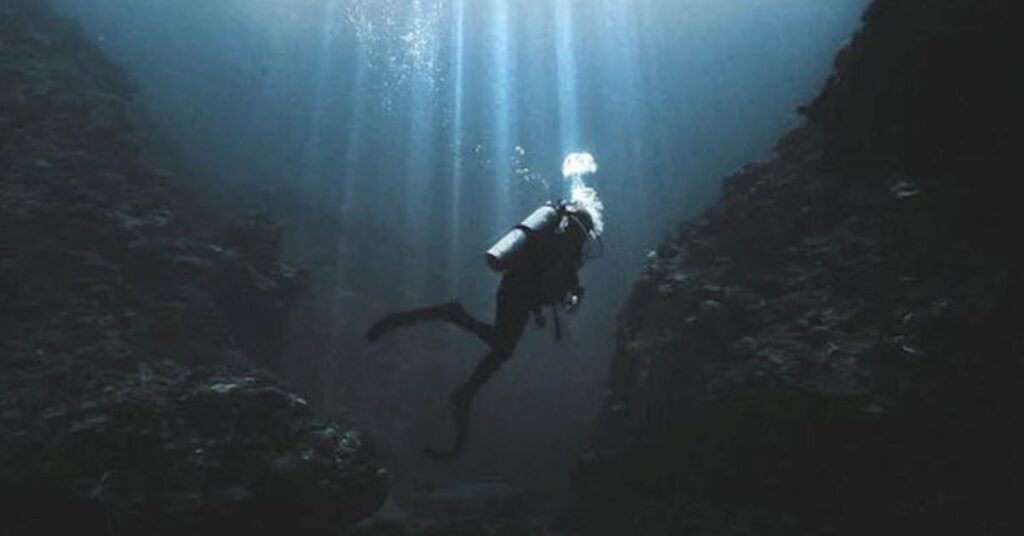
Staying calm underwater is not just a matter of comfort—it’s a critical skill that can save your life. Panic is one of the leading causes of diving accidents, but the good news is that it can be avoided with the right techniques and mindset.
Whether you’re a beginner learning the ropes or an experienced diver facing challenging conditions, these proven strategies will help you stay composed, confident, and in control beneath the waves.
1. Practice Controlled Breathing Techniques
One of the first signs of panic underwater is rapid, shallow breathing. Learning how to control your breathing is one of the most powerful tools you have to stay calm.
- Breathe slowly and deeply through your regulator.
- Use the 4-4-4 breathing method: inhale for 4 seconds, hold for 4 seconds, and exhale slowly for 4 seconds.
- Focus on exhaling fully to prevent carbon dioxide buildup, which can trigger anxiety.
- Pay attention to your breathing rate regularly throughout the dive to detect early signs of stress.
Tip: Practice deep breathing exercises on land before your dive to make it second nature underwater.
2. Always Rely on the Buddy System
Diving is not a solo activity. Having a trusted dive buddy by your side increases safety and can dramatically reduce anxiety.
- Before the dive, establish clear communication signals and an emergency action plan.
- Stay within visual and physical reach of your buddy at all times.
- Regularly check in with each other during the dive, even with a simple OK hand signal.
Knowing that someone has your back provides tremendous peace of mind and can prevent small problems from turning into big emergencies.
3. Improve and Maintain Your Diving Skills
Confidence is key when it comes to avoiding panic underwater, and confidence comes from practice.
- Take refresher courses regularly, especially if you haven’t dived in a while.
- Master basic emergency skills like mask clearing, regulator retrieval, and buoyancy control.
- Practice hovering in mid-water and emergency ascents during controlled training sessions.
- Continuously build your experience by progressing slowly to more challenging dive sites.
The more automatic your skills become, the less likely you are to panic when something unexpected happens.
4. Avoid Overexertion
Diving should be a relaxing and enjoyable activity, not a race or a workout.
- Move slowly and deliberately underwater to conserve energy.
- Use efficient fin techniques like the frog kick to reduce effort.
- Monitor your air supply and depth regularly to avoid surprises.
- Remember: if you start feeling tired, pause, breathe, and rest. There’s no rush underwater.
By staying relaxed and pacing yourself, you’ll preserve energy, reduce anxiety, and enjoy a safer dive.
5. Recognize and Address Early Signs of Panic
Panic doesn’t usually come out of nowhere. There are warning signs—if you know how to spot them.
Look out for:
- Rapid breathing
- Racing thoughts
- Difficulty focusing
- Tightness in the chest
- Feeling the urge to bolt to the surface
If you notice any of these signs:
- Stop what you’re doing.
- Breathe slowly and deeply.
- Think about your situation rationally.
- Act according to your training, not your fear.
Signal your buddy if you need help or time to regain composure. Remember: stopping for a few seconds to gather yourself is always better than making a rash decision.
Final Thoughts: Calmness is a Skill You Can Train
Staying calm underwater is not something you’re born with—it’s something you develop through preparation, practice, and mindset.
Every diver, no matter how experienced, faces moments of uncertainty. What separates safe divers from dangerous situations is their ability to manage fear before it turns into panic.
By using controlled breathing, trusting your buddy, honing your skills, pacing yourself, and paying attention to your mental state, you’ll be ready to tackle challenges confidently and enjoy the amazing world beneath the surface.
The Role of Training in Preventing Panic
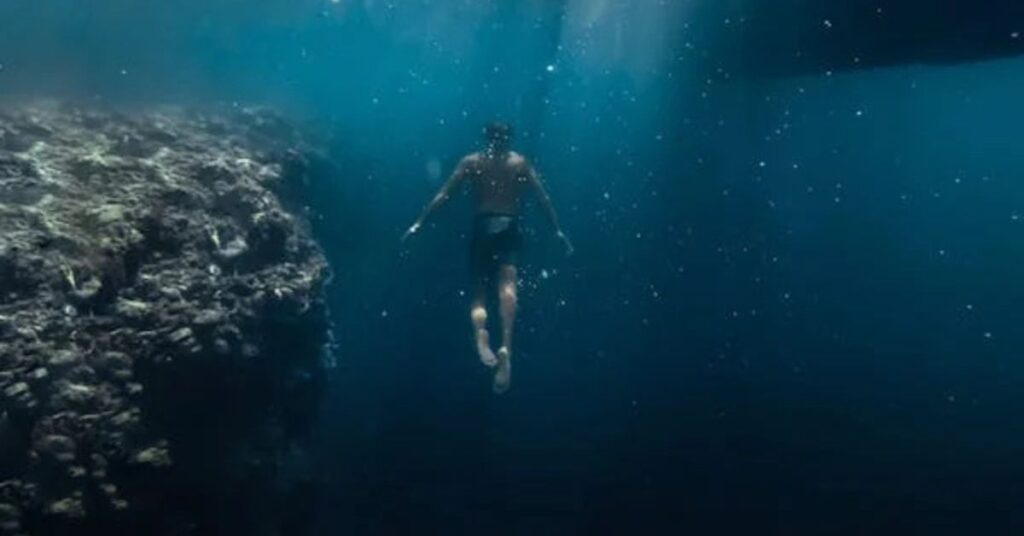
Training is the cornerstone of safe scuba diving. Proper dive training not only teaches the technical skills needed to explore the underwater world but also plays a crucial role in preventing panic when challenges arise.
When divers are well-trained, they react calmly and correctly under pressure rather than giving in to fear. Let’s explore how training helps prevent panic underwater and why investing in your diving education is one of the smartest moves you can make.
1. Building Muscle Memory for Emergency Situations
In a panic, the brain often struggles to think clearly. That’s why muscle memory—the automatic ability to perform tasks without conscious thought—is vital underwater.
Training repeatedly reinforces:
- Regulator recovery and clearing techniques
- Mask removal, clearing, and replacement drills
- Controlled emergency ascents (both assisted and solo)
When these skills become second nature, a diver doesn’t have to “think” during a stressful moment—they just react correctly.
This automatic response significantly reduces the risk of panic and allows the diver to stay composed even when something unexpected happens.
2. Learning Proper Emergency Procedures
Good dive training ensures that divers:
- Know what steps to take in an emergency
- Understand how to ascend safely without risking decompression sickness
- Are familiar with alternative air source use (sharing air with a buddy)
- Can manage out-of-air scenarios or equipment failures
When you’re confident in your ability to handle emergencies, you’re much less likely to panic. Thorough training gives divers options and backup plans, turning fear into focused action.
3. Stress Management Techniques
Modern scuba courses (especially advanced or rescue-level certifications) increasingly emphasize mental training alongside physical skills.
Stress management training teaches divers:
- How to recognize early signs of anxiety
- Breathing techniques to control stress
- Mindfulness strategies to stay present and calm underwater
- The importance of stopping, thinking, and then acting logically
By practicing stress management skills in a controlled environment, divers build the psychological resilience needed to remain calm when real challenges occur.
4. Confidence Through Experience
Training dives and certification courses progressively expose divers to different environments:
- Shallow open water dives
- Navigation exercises
- Night dives
- Deep dives
Each new experience adds a layer of confidence.
The more environments and minor problems you encounter during training, the less intimidating unexpected challenges will feel later on.
Confidence built through structured learning is a powerful antidote to panic.
5. Rescue Diver Training: Preparing for the Unexpected
Taking a Rescue Diver course is one of the best ways to become a truly calm and capable diver.
Rescue Diver training teaches you:
- How to recognize and assist panicked divers
- Techniques for calming others and yourself underwater
- Skills for managing both self-rescue and buddy rescue situations
Knowing you have the tools to help not just yourself but also others massively boosts confidence and drastically reduces panic risk.
Conclusion
Panic underwater is one of the most dangerous challenges a scuba diver can face, but with the right preparation, it’s completely preventable.
Understanding what happens if you panic while scuba diving, recognizing the common causes, and mastering strategies to stay calm are crucial steps toward ensuring every dive remains safe and enjoyable.
Controlled breathing, strong buddy communication, ongoing training, and mental resilience all play critical roles in handling stress underwater.
Remember, panic doesn’t have to control your dive experience. By investing in your skills, staying aware of your mental state, and practicing stress management techniques, you can dive with greater confidence and truly enjoy the incredible beauty of the underwater world.
Scuba diving should be an adventure filled with awe, not fear.
Stay calm, stay prepared, and dive safe.
FAQs
What should I do if I start panicking underwater?
Stop, breathe, think, and act. Slow your breathing, focus on staying still, and signal your dive buddy for assistance.
Can panic cause drowning while scuba diving?
Yes, panic can lead to uncontrolled movements, equipment removal, or rapid ascents, increasing the risk of drowning.
How common is panic in scuba diving?
Panic is relatively common, especially among new divers. However, proper training and experience significantly reduce the risk.
Does practicing meditation help with diving anxiety?
Yes, meditation and mindfulness techniques improve breath control and reduce anxiety, making them beneficial for divers.
What are the dangers of an emergency ascent due to panic?
Rapid ascents can cause decompression sickness, lung overexpansion injuries, and barotrauma. It’s crucial to ascend slowly and safely.

